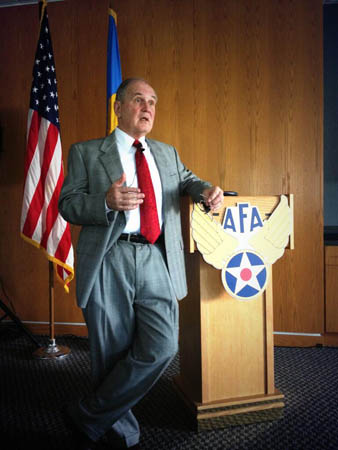 While US policy is pushing towards nuclear disarmament, the rest of the world is taking a different tack, said Barry Watts, senior fellow at the Center for Strategic and Budgetary Assessments, on Thursday. While the United States and Soviet Union held the overwhelming majority of nuclear weapons during the Cold War, the concentration is not as dense today, as countries from Pakistan to North Korea to Iran are either declared nuclear powers or seeking to expand into the realm, he said during a presentation sponsored by AFA’s Mitchell Institute for Airpower Studies in Arlington, Va. Watts cited North Korea and Iran, in particular, as countries that learned lessons from the US invasion of Iraq—and see nuclear weapons as a protective measure against “conventional regime change,” as he put it. Use of nuclear weapons in the event of a conventional war is not necessarily clearly defined by some countries, noted Watts. For example, Russian military doctrine has a very different view about limited nuclear use in a theater context and Pakistan appears to entertain similar thoughts. The danger is that the limited use of nuclear weapons could be seen as a “new normal” by some nations, he said during his May 30 talk. (See also Watts’ April CSBA study Nuclear-Conventional Firebreaks and the Nuclear Taboo.)
While US policy is pushing towards nuclear disarmament, the rest of the world is taking a different tack, said Barry Watts, senior fellow at the Center for Strategic and Budgetary Assessments, on Thursday. While the United States and Soviet Union held the overwhelming majority of nuclear weapons during the Cold War, the concentration is not as dense today, as countries from Pakistan to North Korea to Iran are either declared nuclear powers or seeking to expand into the realm, he said during a presentation sponsored by AFA’s Mitchell Institute for Airpower Studies in Arlington, Va. Watts cited North Korea and Iran, in particular, as countries that learned lessons from the US invasion of Iraq—and see nuclear weapons as a protective measure against “conventional regime change,” as he put it. Use of nuclear weapons in the event of a conventional war is not necessarily clearly defined by some countries, noted Watts. For example, Russian military doctrine has a very different view about limited nuclear use in a theater context and Pakistan appears to entertain similar thoughts. The danger is that the limited use of nuclear weapons could be seen as a “new normal” by some nations, he said during his May 30 talk. (See also Watts’ April CSBA study Nuclear-Conventional Firebreaks and the Nuclear Taboo.)
House, Senate Unveil Competing Proposals for 2026 Budget
July 11, 2025
Lawmakers from the House and Senate laid out competing versions of the annual defense policy bill on July 11, with vastly different potential outcomes for some of the Air Force’s most embattled programs.